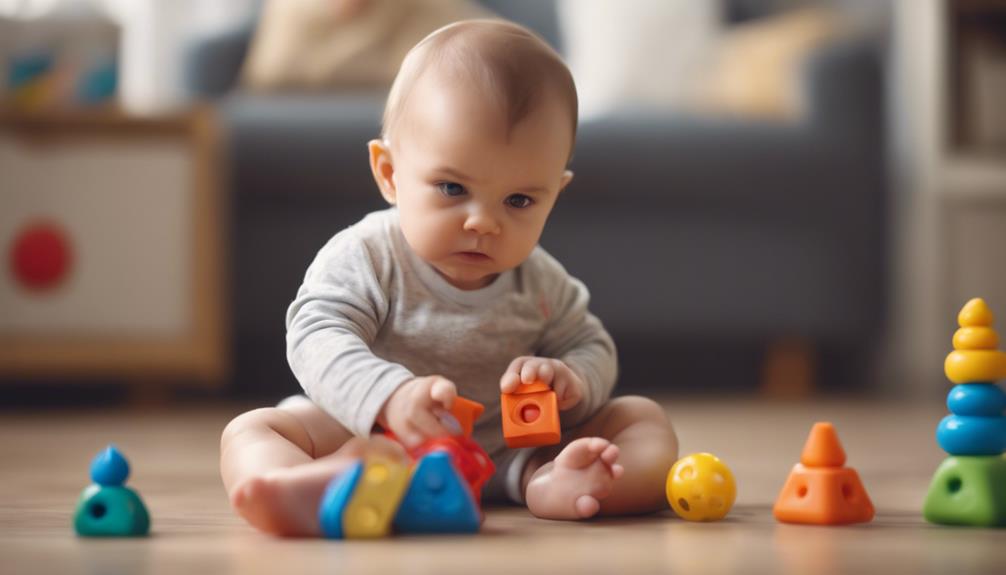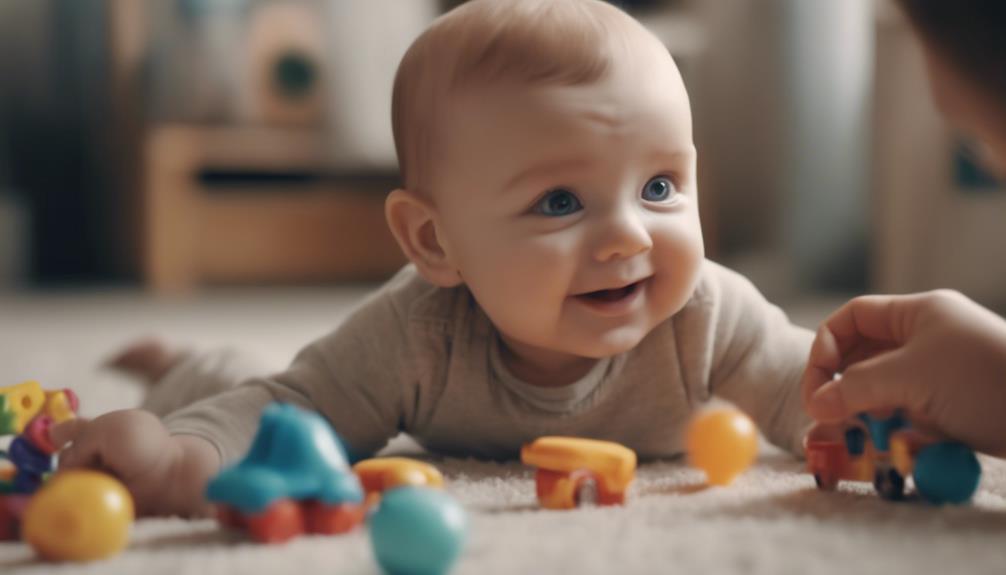To identify a talented baby, seek out early indicators like a strong interest in reading, advanced problem-solving skills, exceptional creativity, high energy levels, unusual sensitivity, quick learning abilities, outstanding problem-solving capabilities, and a long attention span. Be on the lookout for eagerness to explore books, logical reasoning in puzzles, artistic talents, boundless enthusiasm, empathy, rapid skill acquisition, and intense focus. Cultivating these qualities can aid in your baby’s growth and development. Pay attention to these signals in your little one to encourage their progress. There is a wealth of information to learn about nurturing gifted babies.
Key Takeaways
- Strong interest in books and reading, early attempts at reading.
- Advanced problem-solving skills and logical thinking.
- Demonstrates exceptional creativity in various forms.
- High energy levels, need for physical activity.
- Shows unusual sensitivity, empathy, and emotional awareness.
Early Reading Skills
Recognize the signs of early reading skills in your gifted baby as they may demonstrate advanced abilities in letter and word recognition. Gifted babies often display a strong interest in books and reading from a very young age. You might notice your little one eagerly flipping through pages, pointing at letters, or even attempting to sound out words before their peers.
These early reading skills can be a strong indicator of advanced cognitive development in your baby.
Some gifted babies surprise their parents by starting to read simple books or words as early as 2-3 years old. This early exposure to reading can ignite a lifelong passion for learning and exploration. If your baby shows a natural affinity for books, make sure to provide age-appropriate reading materials to nurture their literacy development.
Encourage their curiosity by engaging with them during story time and fostering a love for the written word. Remember, every step you take to support their early reading skills will contribute to their overall cognitive growth and development.
Advanced Reasoning Abilities
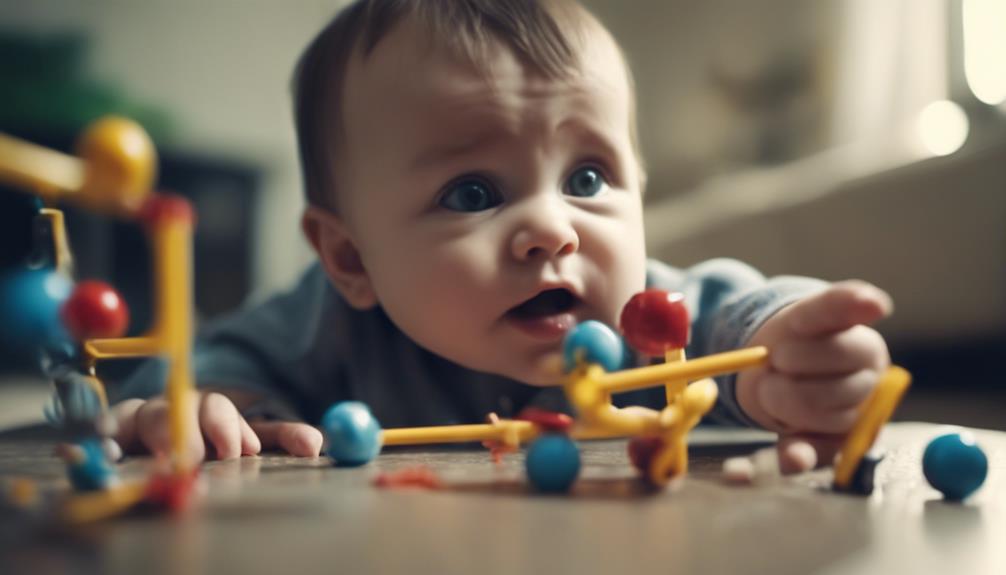
As you observe your baby, pay attention to how they tackle challenges and puzzles, as this can indicate their advanced reasoning abilities.
Notice if they show early signs of problem-solving skills by approaching problems in a logical and systematic way.
Early Problem-Solving Skills
Gifted babies with advanced reasoning abilities often demonstrate impressive problem-solving skills at a young age, showcasing their exceptional cognitive processing capabilities. These infants exhibit early problem-solving skills that go beyond basic expectations, displaying logical thinking abilities that stand out even in their early stages of development.
Gifted babies may astound you with their capacity to analyze situations, recognize patterns, and solve puzzles with remarkable efficiency. Their advanced reasoning abilities enable them to make sense of complex problems, showcasing a level of cognitive processing that sets them apart from their peers.
As a parent or caregiver, you can support these budding problem-solving skills by providing stimulating environments that encourage exploration and critical thinking. Simple activities like shape sorters, stacking blocks, or interactive games can help nurture their logical thinking skills and foster their natural problem-solving inclinations.
Complex Relationships Understood
Understanding intricate connections effortlessly, gifted babies with advanced reasoning abilities can navigate complex relationships with remarkable insight. Their advanced cognitive abilities enable them to approach interpersonal dynamics with a depth that surpasses their age.
Gifted babies showcase exceptional logical thinking skills, allowing them to analyze social situations with precision and clarity. Through critical thinking, they can unravel the complexities of human interactions, often demonstrating a profound understanding of cause-and-effect relationships within relationships.
As a parent or caregiver of a gifted baby, it's essential to foster and support their advanced reasoning abilities when it comes to understanding complex relationships. Encouraging them to engage in discussions about emotions, perspectives, and social interactions can further enhance their critical thinking skills. Providing opportunities for them to navigate various social scenarios can also help them apply their logical thinking skills in real-life situations.
Exceptional Creativity
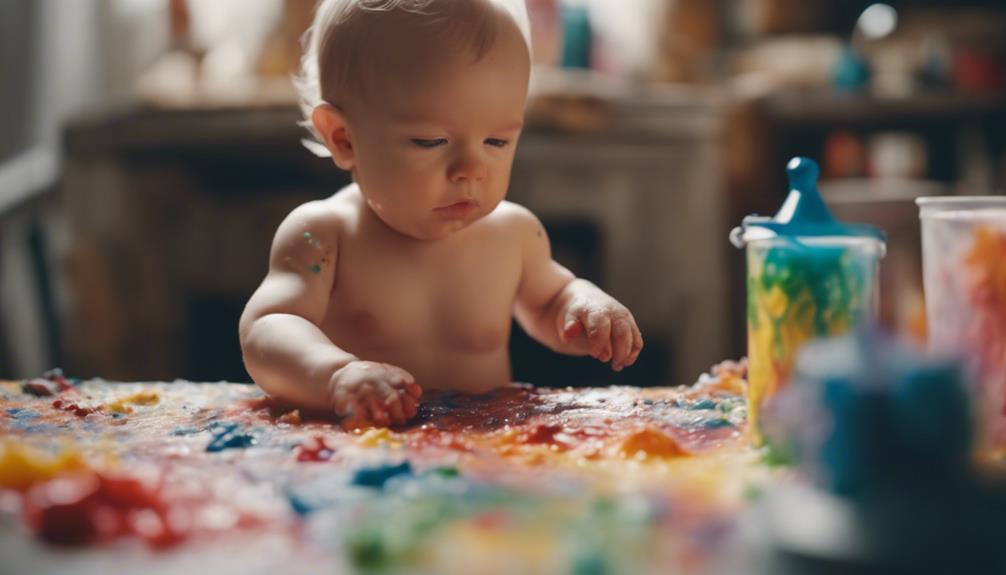
Exceptional creativity in gifted babies often manifests through advanced artistic skills displayed at a young age. These gifted little ones may surprise you with their imaginative abilities, showcasing talents in drawing, storytelling, or other creative endeavors.
It's not just about making pretty pictures; expressing creativity in various forms is a key indicator of giftedness early on. Beyond art, their above-average creativity extends into problem-solving and innovative thinking.
So, if you notice your baby showing early signs of exceptional creativity, it could be a clue to their potential artistic talent. Encourage and nurture these abilities by providing them with opportunities to explore different artistic mediums and engage in activities that stimulate their creative thinking.
High Energy Levels

Is your baby constantly on the move, showing boundless enthusiasm for exploring their surroundings? High energy levels in gifted babies often translate into active behavior and vigorous movements as they seek out new experiences.
Encouraging their curiosity through engaging activities can help channel this energy into positive learning opportunities.
Active Baby Behavior
With high energy levels, gifted babies often demonstrate active and vigorous behaviors, engaging in constant movement and exploration. These signs of high energy in gifted babies may include a strong desire for physical activity, a need for mental stimulation, and a curiosity that drives them to explore their surroundings relentlessly.
Gifted babies with active behavior tend to be constantly on the move, whether it's crawling, climbing, or reaching for new objects to investigate. As a parent, it's essential to provide outlets for this energy, such as interactive toys, safe spaces to explore, and engaging activities that challenge their developing minds.
Vigorous Infant Movements
Recognizing the signs of a gifted baby includes observing their vigorous infant movements as a key indicator of their high energy levels. Gifted babies tend to be movers and shakers right from the start, displaying active behaviors that set them apart.
You may notice your little one engaging in lively infant movements, showing a restlessness that hints at their vibrant energy. These constant motions aren't just random; they're a window into the high energy levels that characterize gifted infants.
Compared to other babies their age, gifted babies often stand out due to their intense physical activity and animated behaviors. Embrace this spirited side of your child, as it signifies their active nature and zest for exploration.
Encourage their movements and provide them with opportunities to channel this energy positively. Remember, those vigorous infant movements aren't just random fidgeting; they're signs of the remarkable energy that fuels your gifted baby's journey of growth and discovery.
Unusual Sensitivity and Empathy

Displaying heightened sensitivity and empathy, gifted babies often react strongly to emotions and stimuli in their environment. This advanced emotional awareness can be seen in their interactions with others and how they perceive the world around them.
Here are some key points to help you understand this aspect of gifted babies:
- Empathy at a Young Age: Gifted infants may show a deep understanding of others' feelings and needs, demonstrating empathy well before their peers.
- Strong Reactions to Stimuli: These babies often have intense emotional responses to their surroundings, reacting strongly to both positive and negative stimuli.
- Advanced Emotional Awareness: Gifted babies can pick up on subtle cues and changes in emotions, showcasing a level of emotional intelligence that sets them apart.
Quick Learning Abilities
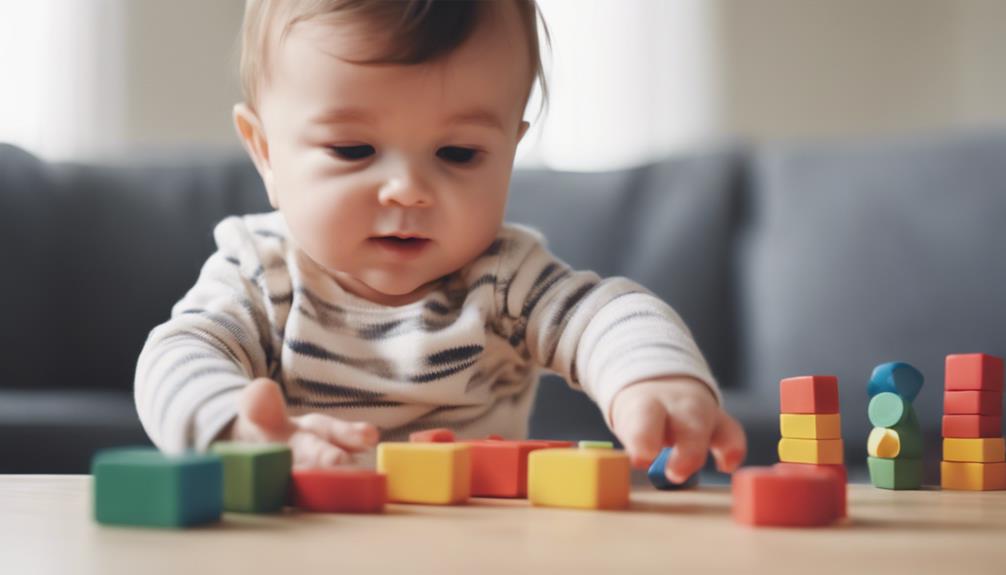
Gifted babies demonstrate exceptional abilities in quick learning, often surpassing their peers in picking up new skills and information at an accelerated pace. These early signs of quick learning abilities in gifted babies can be indicators of advanced cognitive processing.
You may notice your baby mastering concepts earlier than expected, showing a keen interest in exploring and understanding the world around them. Their rapid acquisition of language, motor skills, and problem-solving tasks can amaze you with their speed and accuracy.
As you interact with your baby, pay attention to their responses and how quickly they grasp new ideas. Gifted babies tend to make connections between concepts effortlessly and exhibit a natural curiosity for learning.
Encourage their inquisitiveness by providing stimulating environments and opportunities for exploration. Engaging in activities that challenge their cognitive abilities can further nurture their quick learning skills. Remember, every interaction is a chance to support and foster their exceptional learning capabilities.
Outstanding Problem-Solving Skills
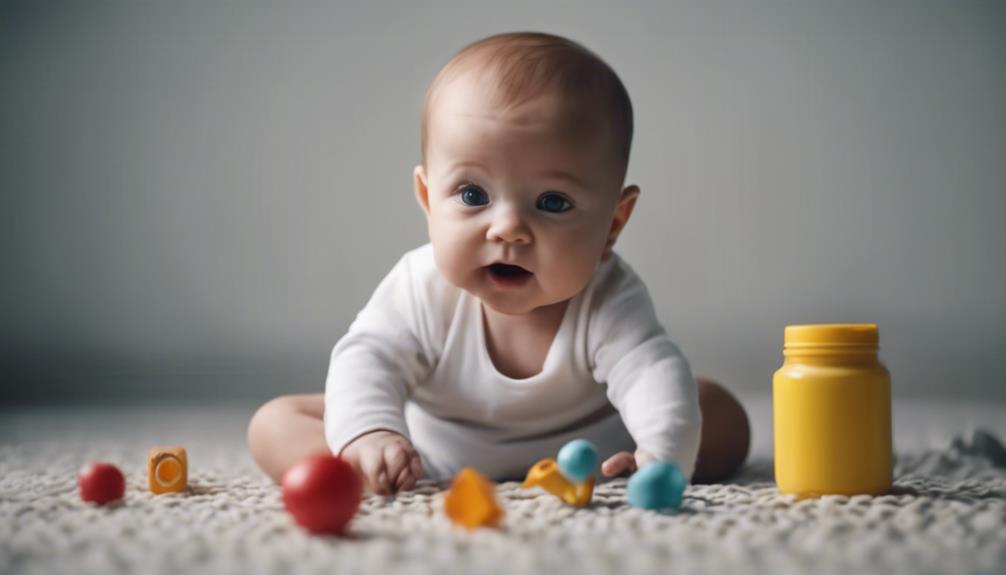
Exceptional problem-solving skills are a hallmark trait of gifted babies. When it comes to problem-solving, gifted babies stand out with their remarkable abilities. Here are a few key points to ponder about their outstanding problem-solving skills:
- Natural Talent: Gifted babies possess a natural talent for problem-solving, often tackling challenges with ease and creativity.
- Advanced Cognitive Abilities: They showcase advanced cognitive abilities by quickly finding solutions to complex problems that may stump others.
- Analytical Skills: These babies exhibit strong analytical skills, allowing them to analyze situations effectively and come up with innovative solutions.
Gifted babies not only excel at solving puzzles and challenges beyond their age but also demonstrate adaptability when faced with new problems. By nurturing and encouraging these problem-solving skills, you can help your gifted baby continue to thrive and develop their cognitive abilities further.
Long Attention Span
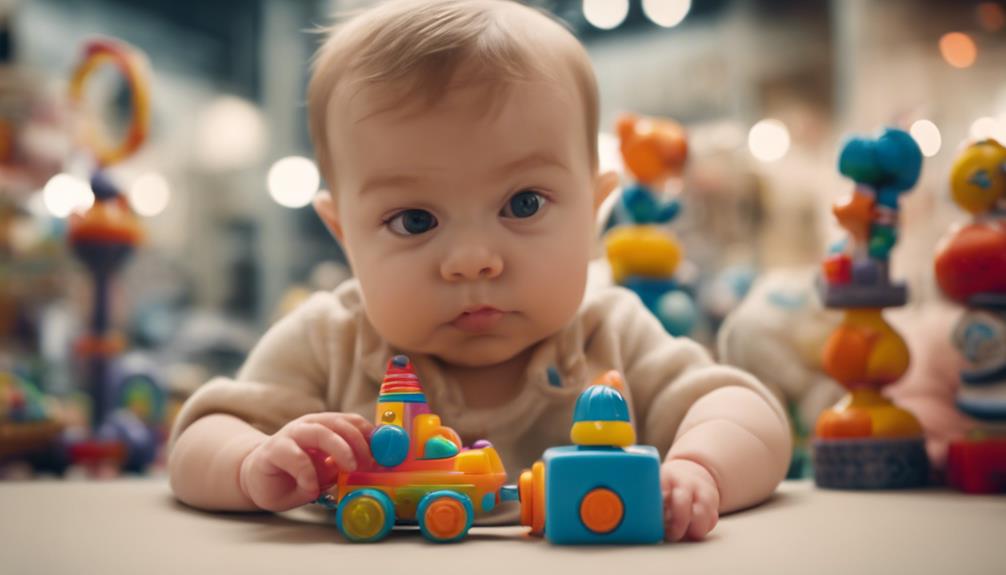
With an unusually long attention span, gifted babies often focus intently on tasks or activities for extended periods. This exceptional ability to maintain focus and attention sets them apart from their peers.
Gifted babies can engage in activities requiring concentration for much longer than others their age, showcasing advanced cognitive processing skills. Studies suggest that their intense concentration on stimulating or challenging tasks demonstrates their superior ability to stay focused.
You may notice your gifted baby engrossed in activities that captivate their interest, surpassing typical attention span expectations. Observing this extended attention span in various activities can provide valuable insights into their cognitive abilities.
Encouraging and fostering this prolonged focus can further enhance their cognitive development. By recognizing and nurturing their long attention span, you can support your gifted baby's growth and help them reach their full potential.
Frequently Asked Questions
How to Tell if Your Baby Is Gifted?
Wondering if your baby is gifted? Keep an eye out for early language skills, advanced motor abilities, heightened awareness, and social understanding. These signs may indicate your little one has exceptional abilities worth nurturing.
At What Age Does Giftedness Appear?
Around 40% of gifted individuals show signs of giftedness by age 3. You may notice exceptional abilities like advanced problem-solving, heightened curiosity, and accelerated learning in your child as early as their toddler years.
How to Identify a High IQ Baby?
To identify a high IQ baby, observe their alertness, language skills, memory retention, problem-solving abilities, empathy, focus, and curiosity. Gifted infants often display advanced motor skills and fast learning. Look for these signs early on.
What Might Be an Indication of a Gifted Child?
Feeling like your child is always asking questions, figuring things out way ahead of schedule, and remembering everything you say? These could be early signs of giftedness. Keep nurturing those curious minds!
Conclusion
As you navigate the journey of raising a gifted baby, remember that each sign is like a precious gem waiting to be polished.
Embrace their uniqueness, nurture their talents, and guide them with love and patience.
Just like a gardener tending to a delicate flower, your care and support will help them blossom into their full potential.
Trust in their abilities, celebrate their achievements, and watch in awe as they shine brightly in this world.

